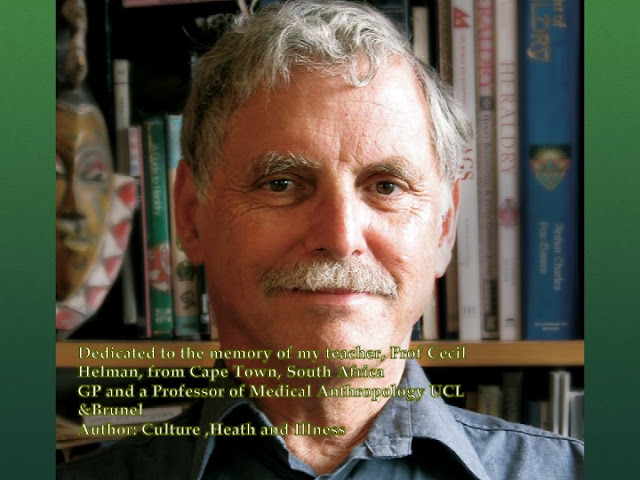A JEWISH DOCTOR INCLINED TOWARDS BUDDHISM WITH
ANTHROPOLOGICAL TRAINING MAY BE YOUR BEST BET IN HEALTH CARE
The four noble truths contain the essence of the
Buddha's teachings. It was these four principles that the Buddha came to
understand during his meditation under the Bodhi tree.
• The truth of suffering (Dukkha)
• The truth of the origin of suffering (Samudāya)
• The truth of the cessation of suffering
(Nirodha)
• The truth of the path to the cessation of
suffering (Magga)
The Buddha is often compared to a physician. In
the first two noble truths he diagnosed the problem (suffering) and identified
its cause. The third Noble Truth is the realization that there is a cure.
The fourth noble truth, in which the Buddha set
out the Eightfold Path, is the prescription, the way to achieve a release from
suffering.
Cecil Helman, an anthropologist, suggested that a patient with a
problem comes to the doctor seeking answers to six questions:
1) What has
happened happened? This
includes organizing the symptoms and signs into a recognizable pattern, and
giving it a name or identity.
2) Why has it
happened? This explains the
aetiology or cause of the condition.
3) Why has it
happened to me? This tries to
relate the illness to aspects of the patient, such as behaviour, diet,
body-build, personality or heredity.
4) Why now? This concern the timing of the
illness and its mode of onset (sudden or slow)
5) What would
happen to me if nothing were done about it? This considers its likely course,
outcome, prognosis and dangers.
6) What are its
likely effects on other people (family, friends, employers, and workmates) if
nothing were done about it? This
includes loss of income or of employment, or a strain on family relationships.
7) What should I do about it – or to whom should I turn for
further help? Strategies for
treating the condition, including self-medication, consultation with friends or
family, or going to see a doctor.
A prominent UCL GP Professor had written:
about Cecil Helman
He stimulated me to ask those frequently
important questions such as ‘what do you think is wrong with you?’ ‘Why do you think it
happened?’ ‘What caused the illness?’ and ‘what do you think will help you to
get better?’ etc. It was his
ground-breaking book, ‘Culture, health and illness’, which opened the eyes of
many practitioners like me to the richness of a patient’s experience, concepts
of illness and relationships with health professionals, when so much of the
trajectory of modern medicine leads us towards ever greater specialisation,
fragmentation and the molecularisation of healthcare. Cecil’s perspective was a counterbalance to
the domination of medicine by the physical and biological sciences and helped
many health professionals to make sense of their day-to-day interactions with
patients.
In contrast, look at the so called
Scientific approach to the Western Disease Care model which the Asians are
eager to copy
Subjective
Tell me what is wrong with you?
Also don't take too long telling me, don't
tell me anything not related to why you came to see me
Preferably in a language I can understand
In a study it was found that American
Doctors interrupt a patient just after 13 seconds. For the first of many times.
Objective
Let me find out what is wrong by examining
you. More and more of the physicians are relegating this responsibility to
others and the machine and “blood tests”
Assessment
This is what I think is wrong with you.
I want the machines and laboratory to help
me be sure.
Plan
This is what I think you should do.
And then the advice is: Exercise More and
Eat Less
Everything is self-cantered on the Doctor
with very little input from the patient. Most of the pronouncements are
quantitative and nothing qualitative, nothing about the suffering of the
patient.
As you can see, it is as if the patient has
left his personality mind and thinking when he changes into the hospital gown
and just becomes a body over which man and machine would contemplate on a
diagnosis, not a good contemplation since most of the chronic diseases are
poorly taken care of in the richer countries, not to mention the copy cat Asian
countries’ Doctors.
Even the American Diabetes Association
admits that the majority of its members are not capable of giving good advice
regarding nutritional management for their patients.
So you decide, who would you rather have,
if you are unfortunate to have a chronic condition?
A western oriented doctor, European or Asian,
who spends his allotted time with you and orders tests and prescribes
medications for you
(In America, they would advertise Board
Certified, which has no meaning whatsoever regarding the quality of the doctor,
all who take the Board Examination pass it)
(also beware of doctors and more and more
other auxiliary professionals who now sport many initials after their name,
Beware, I say, they are trying to hide something! It is incongruous and out of
order to put MBA after your name, a degree that is highly suspect if you are a
health care provider)
Or
A Jewish doctor who is inclined to Buddhist
values, with training in Anthropology who asks about your family before he
begins to questions you on your symptoms?




